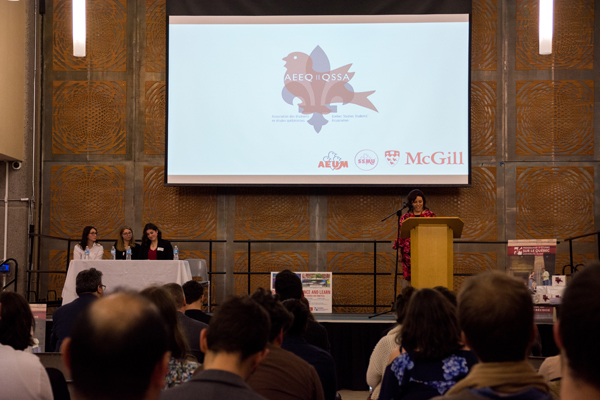The Quebec Studies Students Association (QSSA) hosted its Kickoff Event on Jan. 12 to celebrate its recent founding and to raise awareness about the Quebec Studies program at McGill. This is the QSSA’s first speaker series since its formation in November 2017 to negotiate the continued existence of the Quebec Studies program, which had its major component cut last semester after a series of low enrollment numbers.
Politicians and community leaders shared their experiences in municipal politics at the bilingual speaker series. Organizations such as Apathy is Boring, which aims to promote youth engagement in politics; Sun Youth, a humanitarian organization operating in Montreal; and L’Itinéraire Magazine, which provides a platform and resources for traditionally marginalized voices, were all present.
With a program focused on local government, speakers at the Kickoff Event encouraged young people to participate in their communities at a political level. For QSSA Vice-President Finance Véronique Leblanc, student organizations should prioritize making entry into formal politics more accessible to students.
“Politics isn’t something that is happening far away from us, nor is it something that we can’t participate in,” Leblanc said. “It is accessible and there are many points of entry but it is the responsibility of student organizations to make these points of entry more accessible to students.”
The event began with a speech about the importance of a dynamic political arena from Kathleen Weil, an elected member of the National Assembly of Québec. Citing her experience as the Minister of Immigration, Diversity and Inclusiveness and as a member of the Comité ministériel du développement social, éducatif et culturel, she emphasized the important role played by committees that target community-specific issues. According to Weil, such committees not only address the needs of constituents, they also provide an avenue for students to debate politics and create observable change in their cities.
“We need a minister responsible for the community, otherwise [programs] get lost and sometimes programs are not well adapted,” Weil said. “One of the things we want to do is create internships so that students can figure out if they want to work in the government.”
Cathy Wong, the speaker of the Montreal City Council, then discussed the role of citizens in their communities, arguing that democracy is a process that takes place throughout the year.
“Although we participate in democracy online, through newspapers, and [through] other publications, we must remember that many decisions are made at City Hall on a daily basis that concern us,” Wong said. ”We must participate in democracy there also, where the elected officials represent us.” *
Younes Boukala, a Political Science student at Université de Québec à Montréal (UQAM) and the Project Montréal party Lachine borough youth ambassador for the 375th anniversary of Montreal, discussed his own experiences as a leader in his community. To Boukala, there are far too few young people involved in formal politics, and addressing this is a key step to increasing political engagement and improving Quebec society.
“The easiest place to start, where we can make the most concrete changes, [is] at the municipal level,” Boukala said. “Young people are the future so we must be in politics.”
Due to the separation of power between the federal and provincial governments in Canada, provinces have autonomy in many policy areas. As a result, Quebec’s policies could serve as a framework from which other other provinces may seek inspiration. Thus, politics in Québec not only affect the immediate Quebec society, but have the capacity to create noticeable change in the wider Canadian context.
*Translated from French to English.








